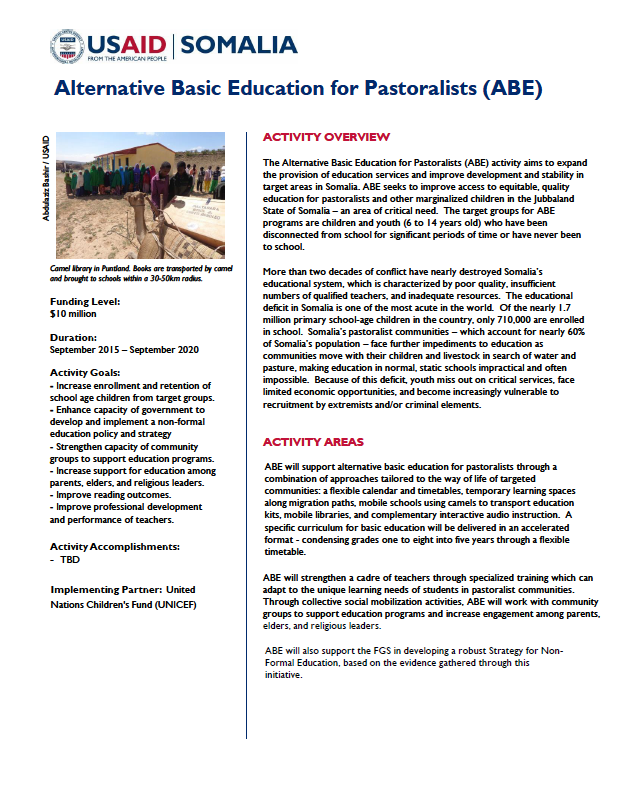ACTIVITY OVERVIEW
The Alternative Basic Education for Pastoralists (ABE) activity aims to expand the provision of education services and improve development and stability in target areas in Somalia. ABE seeks to improve access to equitable, quality education for pastoralists and other marginalized children in the Jubbaland State of Somalia – an area of critical need. The target groups for ABE programs are children and youth (6 to 14 years old) who have been disconnected from school for significant periods of time or have never been to school.
More than two decades of conflict have nearly destroyed Somalia’s educational system, which is characterized by poor quality, insufficient numbers of qualified teachers, and inadequate resources. The educational deficit in Somalia is one of the most acute in the world. Of the nearly 1.7 million primary school-age children in the country, only 710,000 are enrolled in school. Somalia’s pastoralist communities – which account for nearly 60% of Somalia’s population – face further impediments to education as communities move with their children and livestock in search of water and pasture, making education in normal, static schools impractical and often impossible. Because of this deficit, youth miss out on critical services, face limited economic opportunities, and become increasingly vulnerable to recruitment by extremists and/or criminal elements.
ACTIVITY AREAS
ABE supports alternative basic education for pastoralists through a combination of approaches tailored to the way of life of targeted communities: a flexible calendar and timetables, temporary learning spaces along migration paths, mobile schools using camels to transport education kits, mobile libraries, and complementary interactive audio instruction. A specific curriculum for basic education will be delivered in an accelerated format - condensing grades one to eight into five years through a flexible timetable.
ABE will strengthen a cadre of teachers through specialized training which can adapt to the unique learning needs of students in pastoralist communities. Through collective social mobilization activities, ABE will work with community groups to support education programs and increase engagement among parents, elders, and religious leaders.ABE will also support the Federal Government of Somalia (FGS) in developing a robust Strategy for Non- Formal Education, based on the evidence gathered through this initiative.
ACTIVITY IMPACT
ABE has constructed 35 ABE Centers in seven villages in the Gedo Region. These centers have 70 temporary classrooms and 35 separate latrines for girls and boys, providing girls with gender-sensitive facilities and safe spaces to increase girls’ enrollment. 558 pastoralist children are now actively enrolled (48% of which are girls), and the numbers are increasing to date. The classrooms have been equipped with educational supplies including teaching and learning materials, chalkboards and desks, and sports and play equipment. 75 teachers have been recruited and are undergoing in-service training.
Social mobilization campaigns are underway to encourage parents to bring their children to school and actively participate in their education. These campaigns also encourage community members help identify other out of schools children in their communities and help them get support to access education.
Communities are currently participating in the development of literacy materials by providing traditional Somali stories, which will be included in learning materials that promote positive and culturally-inclusive messages.
NEXT STEPS
- Engagement of approximately 21,000 pastoralist children and other out-of-school children within the targeted communities
- Contribution to the first Somali national workshop on learning assessment and EGRA scheduled to take place in early May 2017








Comment
Make a general inquiry or suggest an improvement.